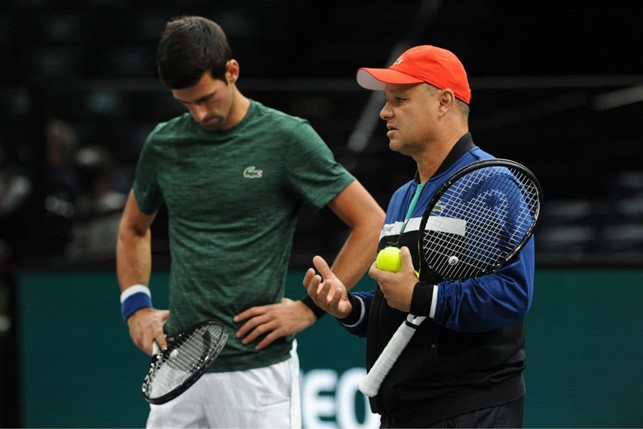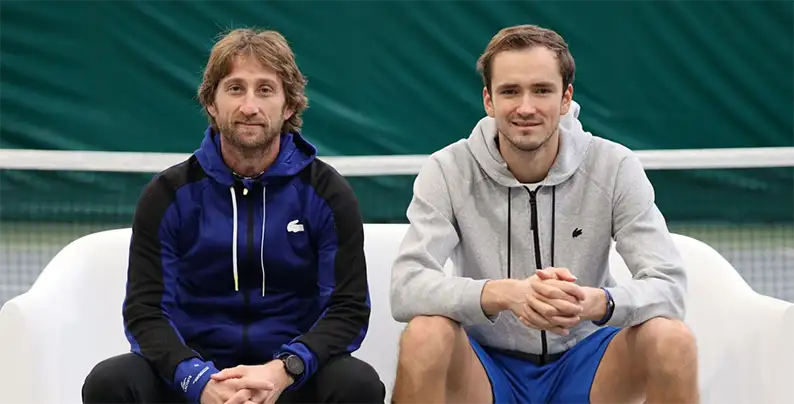Coaching is one of the most overlooked parts of tennis, but not just tennis. It’s something that’s greatly overlooked in most sports despite how fundamental it is. The sheer impact of a coach can be best demonstrated by the results they achieve.
Oftentimes, a different coach gets a very different result from a player or a team and much of that has to do with their approach. While most sports would be considered simple in their essence, coaching is a deeply complicated thing. It requires tremendous people skills as well as knowledge about the sport, so let’s take a look at who some of the best tennis coaches out there are.
Darren Cahill
We have to start with the 59-year-old Australian who just coached Jannik Sinner to one of the best seasons we’ve seen in recent history.
Cahill (image on top) used to be a player, a decent one at that, with solid success during his playing days which included both singles and doubles success. He’s simply an individual who knows a lot about the sport and it’s pretty evident in just how he speaks about the sport.
As good as he was as a player, he’s been far better as a coach, coaching a couple of players that ended up being No 1. Andre Agassi, Lleyton Hewitt, Simona Halep and now Jannik Sinner are all players that elevated themselves under him. Combining his tennis experience with a data-driven but highly empathetic style of coaching seems to resonate well with his players.
He motivates his players to set up challenges for themselves and pushes them to pursue these, hoping to ultimately coach himself out of a job, which is a very interesting way of thinking. He doesn’t think a coach needs more than three to four years with a player and that’s generally been a trend with his clients.
Having had success on both the ATP and WTA, Cahill is undoubtedly one of the biggest names in the sport and will go down as a historic tennis coach once he retires.
Marian Vajda
While Novak Djokovic had several coaches in his time, none has been as fundamental as Marian Vajda. The legendary player has had success under both Boris Becker and Goran Ivanisevic lately and might have been equally good under anyone, but one man stands out as vital: Vajda.
We have to look at the man that shaped possibly the greatest player of all time. The impact Vajda had on Djokovic is something the Serbian would never deny and those in the know certainly agree.

Much like Cahill, Vajda is a former player who peaked at No 34 in singles, so not just a former player but a really good one. His protege, however, blew all of that out of the water, and one thing that might have been crucial was Vajda’s insistence on diet and fitness.
Djokovic was always a hard worker, but under Vajda, he became meticulously maniacal about both his diet and his fitness, which ultimately did help him. He was famously considered rather weak physically at the start of his career but became an iron man in years past.
That obsessiveness was both a positive and a curse because during the pandemic, it ultimately impacted his legacy quite negatively. Still, altogether, it was a net positive for Djokovic who wouldn’t be what he became without it.
Vajda’s approach isn’t just detail-focused, it’s also somewhat light, keeping the relationship somewhat goofy at its base. That approach allowed Djokovic to transform himself from a very talented up-and-coming star to arguably the greatest tennis player of all time.
Since parting ways with Djokovic, Vajda has gone on to coach Alex Molcan, an up-and-coming Slovakian player.
Alexander Zverev Sr.
Alexander Zverev Sr. has been the coach of his son Sascha Zverev for a very long time. He wasn’t his coach at all times because he had to step back due to some health issues, but for much of his career, the father was monumental to the son.
There are a few reasons for that, but most of it is that for the older Zverev, this coaching gig was something that evolved naturally. He oversaw both his sons’ development and any mistakes he made in his first run with his older son Mischa, he could fix with Sascha.
Zverev Jr. is on record explaining that his father has been much less strict with him compared to his brother, which likely comes from years of experience coaching. With time you pick up on what works and not, but hard work was always at the center of it all.
Zverev Sr. demanded hard work and the younger Zverev obliged, becoming one of the fittest players on tour despite battling diabetes for much of his life. Having a really good father-son relationship off the courts only makes things even smoother.
Juan Carlos Ferrero
Most tennis fans will know this name quite well because he is one of the best players turned coaches that we have out there. Ferrero famously was No 1 at one point and a really good player for much of his career.
His coaching career has been mostly tied to Carlos Alcaraz, whom he started coaching a couple of years ago when he was still a teenager. Since then, the pairing has become extremely close with Alcaraz calling Ferrero his “second father”.
As a player who became No 1 himself, something that Alcaraz aspired to, the Spaniard was the perfect person to coach him and it has worked out really well. Ferrero focuses greatly on the minor things in the sport while underlining hard work.
He spoke a few times about his philosophy in coaching, believing it’s very important to adapt your own ideas about the game to what the player is capable of. The aggressive style is all Ferrero, which lines up well with Alcaraz’s skill set and so far, it’s yielded lots of success – arguably the hottest start to a tennis career out of all tennis players in recent decades.
Gilles Cervara
We have to mention one of the more interesting coaches out there whose player has a game that basically defies most tennis rules. Daniil Medvedev has a really funky technique, but instead of trying to change that, Cervara embraced it, and what a brilliant choice it was.
Medvedev might not look like a tennis player, but he is by far one of the best players out there. When you look at how he plays, you think he’ll trip himself over every few steps, but he doesn’t and he’s actually a very efficient player.

That’s all thanks to Cervara’s approach, who never tried to change Medvedev. He adapted to his needs and together they have crafted a style that gives problems for a lot of players. Another staple of Cervara’s coaching is simply building a strong relationship with the player and encouraging them.
When Medvedev was 15, Cervara did just that, embracing him and his funky play, admitting to being quite captivated by it. He proved himself and everyone else right as Medvedev ultimately rose to become world No 1.
Patrick Mouratoglou
While talking about coaches, we have to mention ‘The Coach’. Patrick Mouratoglou calls himself that on social media and it’s hard to argue that he’s not tennis coaching personified. The Frenchman built his reputation mostly thanks to his association with Serena Williams, but he’s a very savvy individual.
Ranging from his famed Mouratoglou Academy, which was attended by players such as Coco Gauff, Stefanos Tsitsipas, Holger Rune, Linda Fruhvirtova, and more, Mouratoglou has proper coaching chops.
He’s not just somebody who talks a lot about tennis, he understands tennis quite well, which is why his track record is massive. He helped Serena Williams further cement her legacy with an almost decade-long association.
He helped Holger Rune take a step forward at a time when it seemed like he was slumping. He also worked with Coco Gauff and Simona Halep, though with less success. He’s now working with Naomi Osaka but has a long history in coaching dating back to 1999.
An Honourable Mention
Those are some of the biggest coaching names out there right now, but the list of great coaches is far too long to summarize in such a short piece. Many great coaches exist and sometimes it’s about the fit.
A famous example might be Dmitry Tursunov, a former Russian player who was pretty solid at his peak but as a coach might have been even better. He’s helped a few players completely transform their game, such as Anett Kontaveit, who became number 2 under him.
When he, however, started working with Emma Raducanu, the fit wasn’t right, and it went nowhere. Sometimes it’s about fit, a match of ideas and vision and vibes. After all, it comes down to how people mesh as coaching is much more than just tennis. It’s people skills as well.















